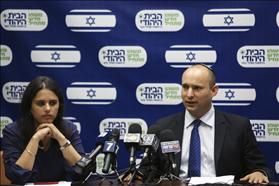Shaping the future of equality
Hiddush takes a formative role in drafting the Equality in Sharing the Burden law
Hiddush's recommendations for the ultra-Orthodox draft law are actively being used by MK Ayelet Shaked and the committee tasked with drafting the Equality in Sharing the Burden law.
15/10/2013 16:21
Tags: equality in sharing the burden · Ayelet Shaked · Shaked Law · Peri Law · ultra-Orthodox draft · IDF

MK Ayelet Shaked from the Jewish Home Party with party chair Naftali Bennett
Among the issues at the forefront of the Knesset's winter session, equality in sharing the burden has returned to be one of hottest topics up for debate. The government coalition is still in the process of putting together a law proposal for the ultra-Orthodox draft, but it is already clear that the law proposal will look significantly different than it did in its original draft. Throughout the entire process, Hiddush has taken a central role in providing lawmakers with the proper materials to employ effective and sustainable policies in order to truly achieve equality in sharing the national burden.
Earlier this year, Hiddush Vice President for Information and Research Shahar Ilan wrote and submitted a comprehensive position paper on this issue to MK Ayelet Shaked, the chair of the committee tasked with preparing the language of the Equality in Sharing the Burden law proposal. The paper highlighted several problematic aspects of the draft that the government coalition was planning on submitting.
Hiddush's 2013 Religion and State Index indicated that a majority of Israelis support the idea of equality in sharing the burden, but the country is split over whether or not the government coalition's proposal will actually achieve that goal. One of the gravest problems present in the government coalition's law proposal is the decision to apply criminal consequences for draft dodgers. Sending ultra-Orthodox men to jail for refusing to serve is both impractical and will undoubtedly raise already heated tensions between the ultra-Orthodox sector and the rest of the country.
These sanctions will be put in place in order to discourage yeshiva students from refusing to draft, but will do so without creating the friction that criminal arrests and incarceration would undoubtedly generate.
Hiddush's position paper included a recommendation to place economic sanctions on draft dodgers instead of placing them in jail. These recommendations have been visibly discussed and will play a formative role in shaping the law. MK Shaked sent out Hiddush's paper to several members of the committee at the opening of the Knesset's winter session and told the team's legal advisor involved in forming the law to "read Hiddush's document" for guidance. The position paper included a variety of ways to apply economic sanctions on draft dodgers and encourage army enlistment without further enflaming strains between ultra-Orthodox yeshiva students and the Israeli government.
The economic sanctions include a measure to suspend funding for yeshiva students that refuse to draft to the army. Similarly, ultra-Orthodox educational institutions that allow draft dodgers to study in their schools will no longer receive state funding. If they continue to refuse draft orders, a number of benefits that ultra-Orthodox yeshiva students have become accustomed to receiving under the previous status quo will be suspended. These sanctions will be put in place in order to discourage yeshiva students from refusing to draft, but will do so without creating the friction that criminal arrests and incarceration would undoubtedly generate.
As the law proposal goes through subsequent drafts, Hiddush will continue to offer resources to Israel's policymakers and use our experience to provide authoritative recommendations for law proposals relating to equality in sharing the burden and all other religion and state issues.